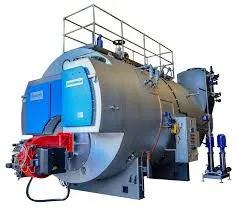
Nov . 27, 2024 17:02 Back to list
Steam Heating Solutions Utilizing Natural Gas for Efficient Energy Production
The Role of Natural Gas in Steam Heat Systems
Natural gas has emerged as a vital energy source in various sectors, particularly in steam heat systems. With its efficient combustion properties and relatively lower emission levels compared to other fossil fuels, natural gas is transforming how we generate steam for industrial processes, heating applications, and even power generation. This article explores the significance of natural gas in steam heat systems, its benefits, and some considerations for its use.
Understanding Steam Heat Systems
Steam heat systems operate on the principle of heating water to generate steam, which can then be used for various applications, including heating buildings, driving turbines for electricity generation, or providing process heat in manufacturing. The systems commonly comprise boilers, piping, and control mechanisms that ensure efficient heat transfer and distribution.
Traditionally, steam generation relied on coal or oil, which, although effective, posed significant environmental concerns. Natural gas offers a cleaner alternative, leading to its rise in popularity in both residential and commercial settings.
Advantages of Natural Gas in Steam Heat
1. Efficiency Natural gas boilers achieve higher efficiency ratings compared to coal or oil-fired systems. This is due to the higher combustion efficiency of natural gas and its ability to produce more heat per unit of fuel.
2. Environmental Impact One of the primary advantages of natural gas is its lower carbon emissions. When burned, natural gas emits approximately 50-60% less carbon dioxide compared to coal. Moreover, it produces virtually no sulfur dioxide and significantly fewer nitrogen oxides, resulting in improved air quality.
3. Cost-Effectiveness Over the past decade, the price of natural gas has been relatively stable and lower compared to oil and coal. This affordability, combined with its higher efficiency, contributes to overall cost savings in steam generation and heating applications.
natural gas steam heat

4. Flexibility Natural gas can be easily transported through pipelines, making it a convenient energy source for centralized heating systems. Additionally, it can be utilized in diverse applications, from industrial steam generation to residential heating, providing versatility to users.
5. Rapid Heat Generation Natural gas systems can achieve the desired temperature much more quickly than traditional systems, enabling swift responses to changes in heating demand. This is particularly beneficial in industries that require precise temperature control or have fluctuating steam requirements.
Challenges and Considerations
While the benefits of natural gas in steam heat systems are substantial, some challenges deserve attention. First, the extraction and transportation of natural gas raise concerns regarding environmental impacts, particularly related to hydraulic fracturing, or “fracking.” This process can result in groundwater contamination and ecological disruption.
Second, the reliance on natural gas, a fossil fuel, contributes to a long-term concern about energy security and climate change. While it is cleaner than other fossil fuels, it is essential to consider renewable energy alternatives, such as solar or wind, for sustainable development.
Finally, transitioning from traditional coal or oil systems to natural gas requires significant investment in infrastructure and technology. Existing systems may need retrofitting, and workforce training is essential for safely operating natural gas equipment.
Conclusion
Natural gas is playing an increasingly crucial role in steam heat systems, offering numerous advantages, including efficiency, lower emissions, and cost-effectiveness. As industries and households aim to reduce their carbon footprint, natural gas emerges as a viable and immediate solution. However, stakeholders must also address the environmental and systemic challenges associated with its use. By balancing the benefits with these considerations, we can better harness natural gas as part of a broader strategy towards cleaner energy solutions. Emphasizing energy transition and sustainability will be key to creating a resilient energy future, one where natural gas serves as a bridge to renewable energy sources.
-
High-Efficiency Commercial Oil Fired Steam Boiler for Industry
NewsJul.30,2025
-
High-Efficiency Biomass Fired Thermal Oil Boiler Solutions
NewsJul.30,2025
-
High Efficiency Gas Fired Thermal Oil Boiler for Industrial Heating
NewsJul.29,2025
-
High-Efficiency Gas Fired Hot Water Boiler for Sale – Reliable & Affordable
NewsJul.29,2025
-
High Efficiency Biomass Fired Hot Water Boiler for Industrial and Commercial Use
NewsJul.29,2025
-
High-Efficiency Biomass Fired Hot Water Boiler for Industrial Use
NewsJul.28,2025
Related PRODUCTS






















